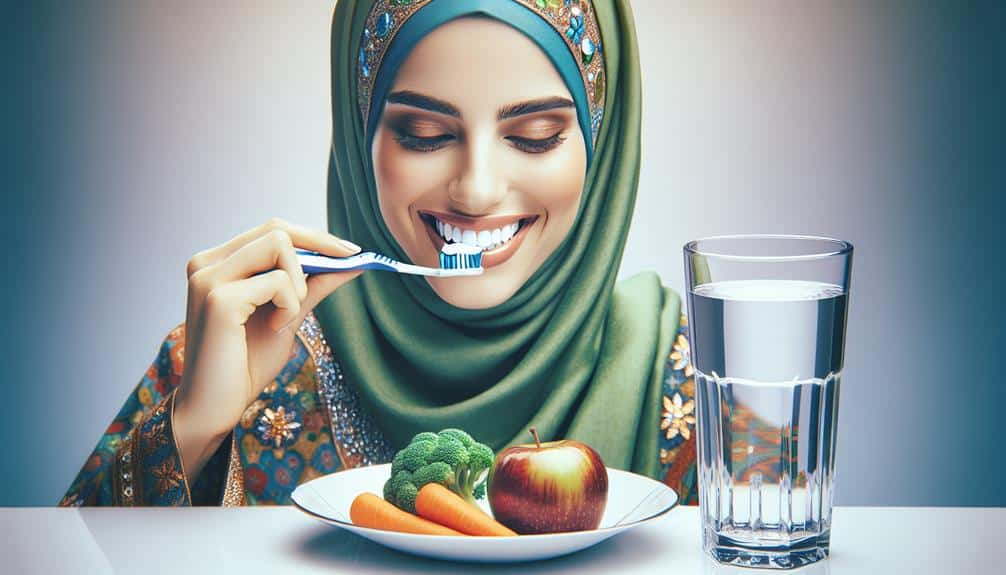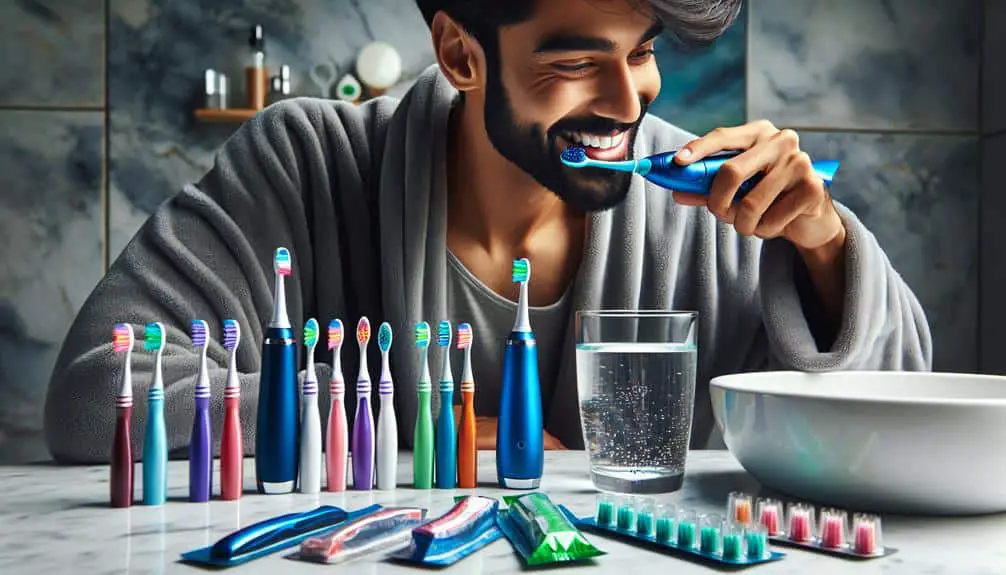To keep your teeth bright white, focus on daily habits like mastering proper brushing techniques, watching your diet by choosing stain-resistant foods, visiting your dentist regularly for check-ups, being mindful of habits that stain your teeth, and incorporating whitening toothpaste into your routine to combat discoloration effectively. Remember, taking these steps will help maintain your smile's brightness and prevent future discoloration issues.
Key Points
- Master proper brushing techniques for stain removal and enamel protection.
- Eat crunchy fruits and limit staining beverages to preserve whiteness.
- Schedule regular dental check-ups for early issue detection and personalized advice.
- Avoid staining habits like consuming berries and rinse mouth after eating.
- Use whitening toothpaste with mild abrasives to combat surface stains effectively.
Brushing Techniques for Whiter Teeth
To achieve whiter teeth, it's essential to master proper brushing techniques that effectively remove stains and plaque buildup. Proper flossing is a critical aspect of maintaining oral health and promoting whiter teeth. When flossing, make sure you're using the right technique to remove food particles and plaque from between your teeth, where your toothbrush can't reach. This helps prevent decay and gum disease, which can contribute to discoloration.
In addition to proper flossing, it's important to think about enamel protection during your oral hygiene routine. Enamel is the outermost layer of the teeth and plays a crucial role in protecting them from decay and damage. To safeguard your enamel while brushing, use a soft-bristled toothbrush and gentle, circular motions. Avoid brushing too vigorously, as this can wear down the enamel over time, leading to sensitivity and discoloration.
Diet Tips to Preserve Whiteness
Preserving the whiteness of your teeth through diet requires mindful choices that support oral health and minimize staining. When it comes to maintaining bright white teeth, your food choices and lifestyle habits play an important role. Here are some tips to help you preserve the whiteness of your teeth:
- Eat Crunchy Fruits and Vegetables: Foods like apples, carrots, and celery can help scrub away surface stains on your teeth while stimulating saliva production, which aids in cleaning the mouth.
- Limit Staining Beverages: Coffee, tea, and red wine are known to cause teeth staining. Try to limit your consumption of these beverages or use a straw to minimize contact with your teeth.
- Stay Hydrated with Water: Water not only keeps you hydrated but also helps wash away food particles and acids that can lead to staining and tooth decay.
Importance of Regular Dental Check-ups
Regular dental check-ups are essential for maintaining peak oral health and preventing potential issues from escalating unnoticed. These routine visits play a vital role in your preventive measures against dental problems. During a check-up, your dentist can detect early signs of issues like cavities, gum disease, or oral cancer, allowing for prompt treatment and preventing further complications.
In addition to addressing existing concerns, regular dental check-ups are integral to optimizing your oral hygiene routine. Your dentist can provide personalized advice on how to improve your brushing and flossing techniques, recommend suitable oral care products, and address any questions you may have regarding your dental health.
Avoiding Staining Habits
One of the key factors in maintaining bright white teeth is being mindful of habits that can cause staining. To prevent discoloration and keep your teeth looking their best, consider the following tips:
- Avoiding Certain Foods: Foods like berries, tomato sauce, and dark-colored beverages like coffee and red wine can stain your teeth over time. Limiting your intake of these items can help prevent discoloration.
- Rinsing After Eating: After consuming foods or drinks known to stain teeth, rinse your mouth with water. This can help wash away pigments before they've a chance to adhere to your teeth.
- Choosing Teeth-Friendly Beverages: Opt for teeth-friendly beverages like water, milk, and green tea. These options are less likely to cause staining and some, like green tea, even contain compounds that can benefit oral health.
Incorporating Whitening Toothpaste
To enhance the brightness of your smile and combat tooth discoloration, contemplate incorporating whitening toothpaste into your daily oral care routine. Whitening toothpaste contains mild abrasives or polishing agents that help remove surface stains on your teeth. These toothpaste products may also include additional ingredients like hydrogen peroxide or carbamide peroxide, which can lighten the color of your teeth over time. When using whitening toothpaste, it's essential to follow the instructions provided on the packaging to achieve the best results.
While whitening toothpaste can help maintain the whiteness of your teeth, it's essential to manage expectations. Whitening toothpaste is more effective at removing extrinsic stains caused by factors like coffee or smoking than intrinsic discoloration. For deeper stains, you may need to contemplate professional treatments such as whitening strips or consult with your dentist for other options like natural remedies. Remember, consistent use of whitening toothpaste, coupled with regular dental check-ups, can contribute to a brighter, healthier smile.
Frequently Asked Questions
Are There Any Natural Remedies or DIY Treatments That Can Help Whiten Teeth?
For natural remedies to whiten teeth, options like baking soda or activated charcoal are popular. While they can be effective, it is crucial to use DIY treatments cautiously to avoid damaging enamel.
How Often Should I Replace My Toothbrush for Optimal Whitening Results?
For ideal whitening results, replace your toothbrush every 3-4 months. Using proper brushing technique with a whitening toothpaste can enhance results. Diet impacts tooth color, but professional treatments can provide more dramatic changes.
Can Certain Medications or Medical Conditions Affect the Whiteness of My Teeth?
Certain medications or medical conditions can indeed impact the whiteness of your teeth. Medications like tetracycline can cause staining, while medical conditions such as acid reflux may harm enamel. Maintaining good oral health is essential.
Is It Safe to Use Whitening Strips or Kits at Home, and What Are the Potential Risks?
Using whitening strips or kits at home can be safe, but professional whitening may offer better results and supervision. Potential risks of at-home methods include tooth sensitivity and gum irritation. Consult your dentist for guidance.
What Are Some Alternative Methods for Whitening Teeth, Aside From Using Whitening Toothpaste?
To whiten teeth beyond just toothpaste, consider oil pulling with coconut oil, using charcoal powder, brushing with baking soda, or rinsing with diluted hydrogen peroxide. These methods offer natural alternatives for a brighter smile.



